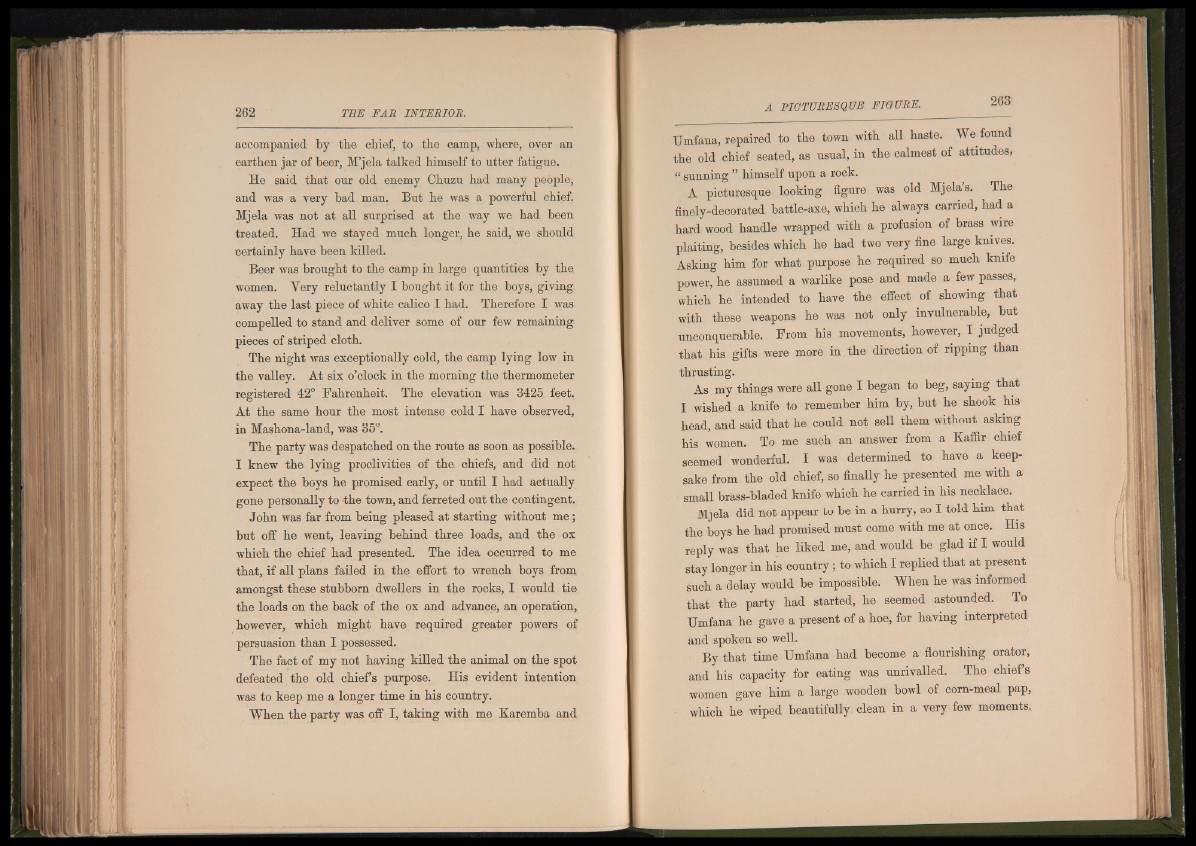
accompanied by the chief, to the camp, where, over an
earthen jar of beer, M’jela talked himself to utter fatigue.
He said that our old enemy Chuzu had many people,
and was a very bad man. But he was a powerful chief.
Mjela was not at all surprised at the way we had been
treated. Had we stayed much longer, he said, we should
certainly have been killed.
Beer was brought to the camp in large quantities by the.
women. Yery reluctantly I bought it for the boys, giving
away the last piece of white calico I had. Therefore I was
compelled to stand and deliver some of our few remaining
pieces of striped cloth.
The night was exceptionally cold, the camp lying low in
the valley. At six o’clock in the morning the thermometer
registered 42° Fahrenheit. The elevation was 3425 feet.
At the same hour the most intense cold I have observed,
in Mashona-land, was 35°.
The party was despatched on the route as soon as possible.
I knew the lying proclivities of the. chiefs, and did not
expect the boys he promised early, or until I had actually
gone personally to -the town, and ferreted out the contingent.
John was far from being pleased at starting without me;
but off he went, leaving behind three loads, and the ox
which the chief had presented. The idea occurred to me
that, if all plans failed in the effort to wrench boys from
amongst these stubborn dwellers in the rocks, I would tie
the loads on the back of the ox and advance, an operation,
however, which might have required greater powers of
persuasion than I possessed.
The fact of my not having killed the animal on the spot
defeated the old chiefs purpose. His evident intention
was to keep me a longer time in his country.
When the party was off I, taking with me Karemba and
Umfana, repaired to the town with all haste. We found
the old chief seated, as usual, in the calmest of attitudes,
“ sunning ” himself upon a rock.
A picturesque looking figure was old Mjela’s. The
finely-decorated battle-axe, which he always carried, had a
hard wood handle wrapped with a profusion of brass wire
plaiting, besides which he had two very fine large knives.
A a i r i n g him for what purpose he required so much knife
power, he assumed a warlike pose and made a few passes,
which he intended to have the effect of showing that
with these weapons he was not only invulnerable, but
unconquerable. From his movements, however, I judged
that his gifts were more in the direction of ripping than
thrusting.
As my things were all gone I began to beg, saying that
I wished a knife to remember him by, but he shook his
head, and said that he could not sell them without asking
his women. To me such an answer from a Kaffir chief
seemed wonderful. I was determined to have a keepsake
from the old chief, so finally he presented me with a
small brass-bladed knife which he carried in his necklace.
Mjela did not appear to be in a hurry, so I told him that
the boys he had promised must come with me at once. His
reply was that he liked me, and would be glad if I would
stay longer in his country; to which I replied that at present
such a delay would be impossible. When he was informed
that the party had started, he seemed astounded. To
Umfana he gave a present of a hoe, for having interpreted
and spoken so well.
By that time Umfana had become a flourishing orator,
and his capacity for eating was unrivalled. The chiefs
women gave him a large wooden bowl of corn-meal pap,
which he wiped beautifully clean in a very few moments.